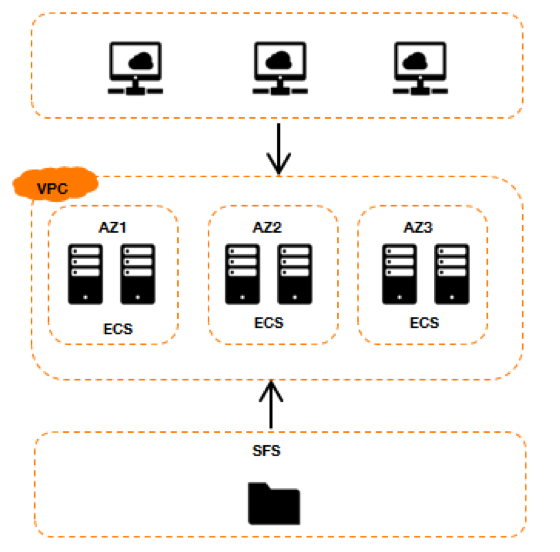Public Cloud – Flexible Engine
Scalable File Service (SFS) – an on demand shared file system
Scalable File Service (SFS) provides an on-demand, scalable, and high-performance shared file system for Elastic Cloud Servers

The service provides the standard protocol for accessing NFSv3 files. Users can integrate their existing applications and tools with SFS without any modification to their applications and tools.
The solution is designed to optimally manage a large volume of storage. SFS is applicable to a wide range of scenarios, such as multimedia processing and content management.
- During setup, users can specify the region and virtual private cloud (VPC) for a file system. SFS only provides shared file systems for ECSs in the same VPC.
- ECSs from different Availability Zones in the same VPC can access the requested file system in all Availability Zones.

Compared to traditional file sharing storage, SFS has the following advantages:
File sharing
Servers from different zones available in the same region can access the same file system, implementing file access and sharing between multiple servers.
Scalability
The service is scalable according to your capacity needs and the services are not interrupted during the scale-up. Scalable File Service guarantees a storage capacity of up to 10PB to meet your needs.
High performance and reliability
Scalable File Service performance improves as capacity increases, delivering 99.99999999% data durability to meet service growth.
Seamless integration
Scalable File Service supports NFSv3, allowing consumer applications to access data through the standard protocol.
Easy operation and low cost
Scalable File Service is available to users by simply creating files and is billed based on storage capacity used.
Limitations of the current version
- Currently, Scalable File Service only supports the NFSv3 protocol.
- SFS does not allow you to change the name, AZ, and VPC membership of existing file systems.
- Each file system belongs to a single VPC and can only be installed on servers in the same VPC.
Scenarios
SFS file systems must be installed on ECS. SFS is applicable to the following scenarios :
- Media handling
TV channels and new media services are more likely to be deployed on cloud platforms. These services include media streaming, archiving, editing, transcoding, content distribution and video on demand (VoD). In such scenarios, a large number of workstations are involved in the entire production process of the program. Different operating systems can be used by different workstations, which requires shared file systems to share documents.
HD / 4K videos have become the most important trend in the broadcasting and television industry. Taking video editing as an example, to enhance the audiovisual audience experience, HD editing is being transformed into a 30-40 layer edit. Therefore, a single edit client might require a file system with bandwidth up to hundreds of MB per second. Producing a single program requires multiple editing clients to simultaneously process massive video material. To meet this requirement, SFS provides customers with stable performance with high bandwidth and low latency.
- File sharing
For a business with a large number of employees, SFS can create shared file systems that are accessible to all staff, to implement file sharing between employees.
- Content management and web service
SFS can be used in various content management systems to store and deliver information for websites, online versions, and archiving.